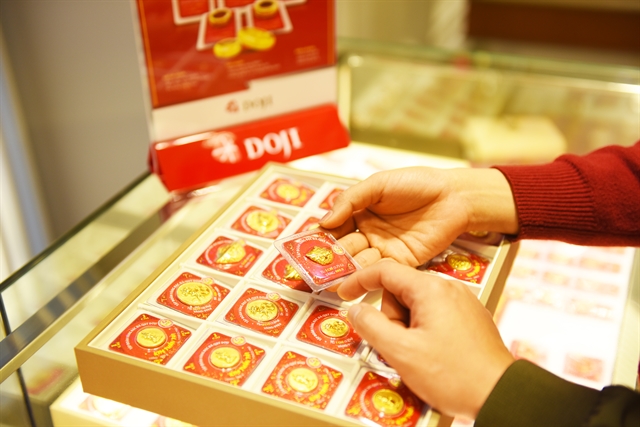The recent surge of gold prices may cause risks for individual buyers, experts and analysts have warned.

The recent surge of gold prices may cause risks for individual buyers, experts and analysts have warned.
At sensitive times, gold firms expand the difference between selling and buying prices to ensure buyers share risks with the shops, so people should think twice before purchasing gold, economist Nguyen Tri Hieu said.
“Gold buyers should be careful because the difference between selling and buying prices on the local market and the gap between domestic and global prices may hurt their pockets,” he said.
“The sharp increase of gold prices in recent days is an opportunity for speculation but the risk is also high,” he said.
There is still a chance to invest in gold in the near future but buyers should accept the risks that come with it, Hieu added.
“Gold could move 10 per cent up by the end of the year but it can also fall 10 per cent.”
“If that risk is acceptable, buyers can pour money into gold but they should not spend all on it,” he said.
It may be the time for previous buyers to take advantage of increasing gold prices to lock in gains, DOJI Gold and Gems Group JSC (DOJI) analysts said.
Gold prices will swing widely in its uptrend and investors may suffer a lot on the way, they said.
Selling gold prices listed at Bao Tin Minh Chau, SJC and Doji on Thursday were VND56.4-56.65 million (US$2,437-2,448) per tael and buying prices were VND57.3-57.92 million ($2,476-2,503) per tael.
Gold futures displayed on CME Group were at $1,950.3 an ounce or $2,600.4 per tael.
The US central bank Federal Reserve on Wednesday night kept interest rates unchanged and said the rates would remain until the economy recovers.
The move depreciated the US dollar and pushed safe-haven assets like gold up.
Real estate an underdog
The surge of gold prices in recent weeks has made gold the top safe-haven asset, replacing real estate, Tran Khanh Quang, CEO of property developer Viet An Land, said.
Sharply-increasing gold prices have shaken up investors’ investment priorities amid volatile financial markets, he said.
Real estate, gold, securities and interest rates are references for investors to decide how they will spend money in the future, Quang said.
Among the four elements, interest rates are low, the stock market is struggling and the real estate sector is still trapped in administrative and legal issues, so their weights in investors’ portfolios weaken, he said.
Meanwhile, worries about the global economic recession make gold among the safest assets, he added.
When the gold market stabilises, attention will return to the real estate sector as the most valuable asset for Vietnamese investors, Quang said.
In the past, people often stockpiled gold which hurt the real estate market, but since all property transactions are made in dong and policies are in place to prevent gold speculation, land transactions have increased and gold has become cheaper, he said.
If interest rates keep falling, financial-banking institutions will be in cash surplus so more capital will flow into the real estate sector rather than into gold, he forecast.
But in the short run, real estate would be hurt because the COVID-19 pandemic has ravaged local industries like tourism while lower incomes would also prevent people from buying property, he said.
On the opposite side, CEO of Dai Phuc Real Estate JSC Nguyen Thi Thanh Huong said increased gold prices in July would not dampen the long-term confidence in the property sector.
“The COVID-19 pandemic and the US-China tension are two major causes of the increased gold prices. The speculation of gold does not expand the economy because it does not create the cash flow for business activities,” she said.
There are various investment options in the last 20 years but real estate products in Viet Nam are still the top priority, she said. — VNS
- Tags
- Real estate
- gold prices





